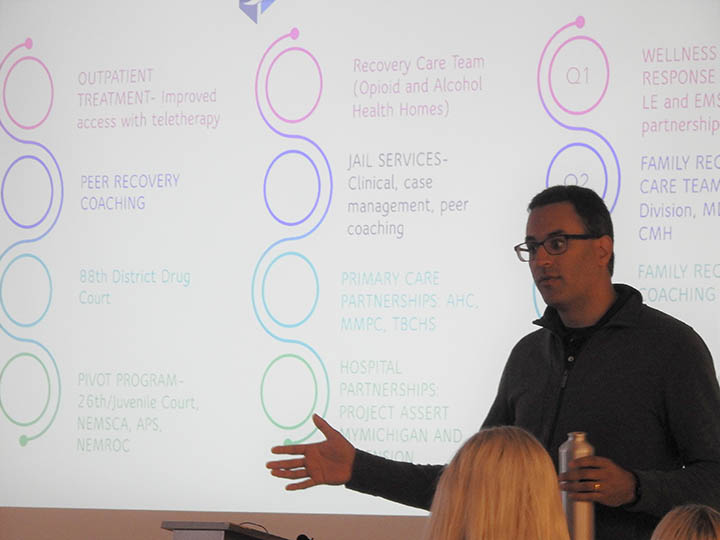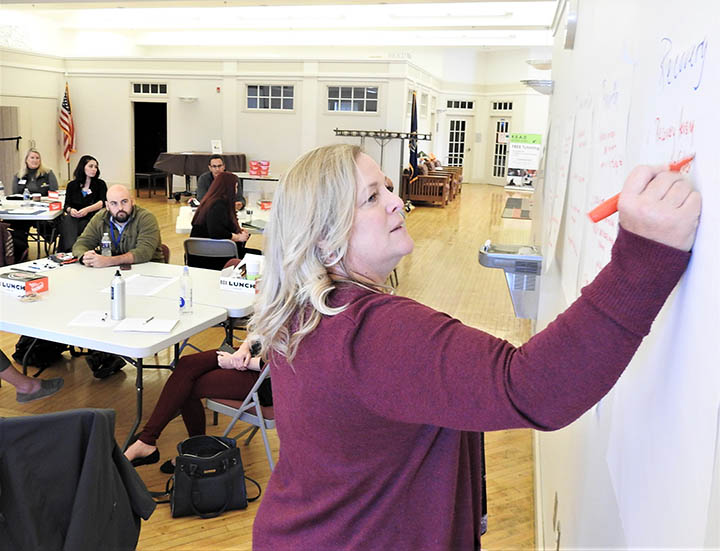Medical leaders brainstorm next steps in addiction response

News Photo by Julie Riddle Larry LaCross, of Catholic Human Services, describes recent Alpena-area efforts to combat addiction at a meeting of health care and addiction response professionals at the Alpena County Library on Thursday.
ALPENA — Acknowledging a crucial link between medical care and addiction recovery, doctors and other representatives of health care organizations met in Alpena on Thursday to figure out what comes next.
Like the rest of the country, Alpena has felt the impacts of an opioid epidemic that has contributed to hundreds of thousands of overdose deaths nationwide.
Doctors overprescribing pain medications in the past added to the problem of addiction, and now they’re helping to fight it, said Kara Steinke, regional administrator for Catholic Human Services.
At Thursday’s meeting, chief executive officers, physicians, and substance use disorder coordinators from MyMichigan Health, Alcona Health Center, and Thunder Bay Community Health Center shared success stories of finding new ways to reduce addiction in Northeast Michigan.
They’ve connected patients to resources, given them tools to fight their addictions, and intentionally treated patients not just as addicts, but as humans, they reported.

News Photo by Julie Riddle Kara Steinke, regional administrator for Catholic Human Services, on Thursday records suggestions for improved addiction recovery efforts on a wall at the Alpena County Library with the help of representatives of medical care centers and addiction recovery-supportive organizations.
They also faced hurdles and roadblocks, and — with 118 overdose-related emergency room visits in Alpena last year, based on state data — there’s work yet to be done, the doctors said.
That’s why they met in an upper room at the Alpena County Library — to figure out the next step in improving the medical community’s response to addiction.
“We need to figure out, where do we go from here?” Steinke said. “The work’s not done.”
About five years ago, Alpena emergency department workers were overwhelmed by people seeking care for symptoms of drug use, overdose, or withdrawal, Steinke said.
A meeting of dozens of northern Michigan doctors eventually resulted in Project ASSERT, which embedded peer recovery coaches in the MyMichigan Medical Center emergency department.
Those coaches, with their own addiction recovery experience, quickly recognize addiction signs and steer someone toward appropriate recovery help.
That program blossomed into other efforts that extended peer recovery coach help onto other floors of the hospital and brought first responders to the doorsteps of someone at risk of an overdose.
On Thursday, health care and other organizations that respond to a person in addiction got together again to talk about gaps that still remain in health care response to addiction.
First sharing their successes, they described a broadening band of practitioners knowledgeable about substance use disorders.
Those physicians, they said, are ready to treat not only the symptoms but the root of what many doctors have begun to see as a sickness, not a lifestyle choice.
Medical center representatives said they have learned where to send people who need more than a doctor’s help, and that Alpena has stepped up to meet many of those needs.
They talked about their challenges, too, many of them lamenting the lack of recovery housing for people trying to stay sober or the lack of transportation options to get patients to crucial treatments in a rural area.
Bending over sandwiches and paper printouts, small groups brainstormed about the work yet to be done.
Steinke scrawled their ideas on blank newsprint on a wall, participants spouting off eager lists of what they wish they could offer the community.
∫ Better regional addiction data.
∫ More treatment options for adolescents.
∫ Peer recovery coaches in schools.
∫ More help for kids living with parents who are addicted.
∫ More tools to get honest answers during medical appointments so doctors can provide more help.
∫ More activities in town that don’t push alcohol.
∫ More people to do the work.
They can’t wait a year to meet again, they said – by then, the list will just be longer.
With supervisory duties in 21 counties, Steinke said the Alpena region offers the strongest collective response to substance use disorder she’s seen in northern Michigan, describing a large and enthusiastic network of people supportive of recovery efforts.
More work remains, and the medical community is on the front lines of that work, she said, applauding the medical community in the Alpena area for taking a leadership role in fighting the drugs that endanger people’s bodies.
Physicians play a crucial role in stopping addiction, and that starts by seeing beyond their patients’ addictions, said Dr. Marion Hautea, chief medical officer for Thunder Bay Community Health Center.
“We treat them as a person,” Hautea said. “We’re here to help you. As a person.”
Julie Riddle can be reached at 989-358-5693, jriddle@thealpenanews.com or on Twitter @jriddleX.
- News Photo by Julie Riddle Larry LaCross, of Catholic Human Services, describes recent Alpena-area efforts to combat addiction at a meeting of health care and addiction response professionals at the Alpena County Library on Thursday.
- News Photo by Julie Riddle Kara Steinke, regional administrator for Catholic Human Services, on Thursday records suggestions for improved addiction recovery efforts on a wall at the Alpena County Library with the help of representatives of medical care centers and addiction recovery-supportive organizations.







